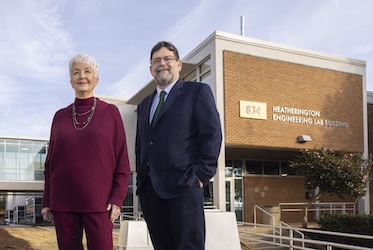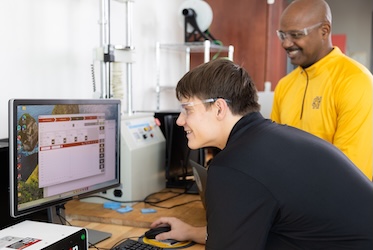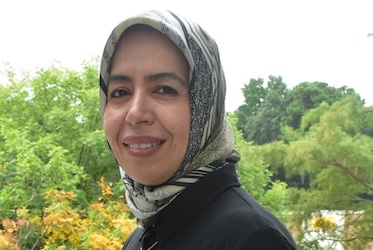

MARIETTA, Ga. | Jul 15, 2020

David Veazie knows what it feels like to be a minority student considering a career in engineering. It wasn’t that long ago he was one.
As a high schooler in Louisiana, he never envisioned himself on the path to conducting research in national laboratories or educating the next generation of engineers. Now a professor of mechanical engineering in Kennesaw State University’s Southern Polytechnic College of Engineering and Engineering Technology, he leverages decades of industry experience at leading institutions, such as the National Aeronautics and Space Administration (NASA) and the Georgia Tech Research Institute (GTRI), as he opens doors for hundreds of underrepresented students.
As program director for Kennesaw State’s Peach State Louis Stokes Alliance for Minority Participation (PSLSAMP) program in Marietta, Veazie has played a direct role increasing the number of underrepresented students who complete degrees in science, technology, engineering and math (STEM) fields through mentorship and research opportunities. But despite his accolades, the field of engineering wasn’t always on his radar.
It wasn’t until his junior year of high school that Veazie participated in the Engineering Summer Institute at Southern University, a historically black college in Baton Rouge where he would later earn his undergraduate degree. It was there that he recalled seeing others who looked like him, an African-American man, excelling in the field that piqued his interest.
“Learning about what kind of lives engineers could live is ultimately what motivated me to keep pursuing the field,” said Veazie, a licensed professional engineer in Georgia. “I found myself emulating my professors seeking that same level of success while I forged my own path, and now I hope I can do the same for the next generation of engineers and academicians.”
After earning his undergraduate degree, Veazie joined the technical staff at AT&T Bell Laboratories in New Jersey before a four-year stint at GTRI as a research engineer. Upon earning his master’s degree and Ph.D. at the Georgia Institute of Technology, he went on to complete a post-doctoral fellowship at NASA’s Langley Research Center.
Though his industry career was fruitful, having participated in high level projects at NASA and earning several million dollars in grant funding, Veazie said he always felt an innate desire to share his knowledge with others just as his mentors did for him.
“In the corporate environment, everything focused on the bottom line,” he said. “In that kind of environment, there aren’t many opportunities to transfer your knowledge. I started to feel that I had more to offer to students, which eventually led me back into academia.”
Veazie launched his teaching career in 1995 at Clark Atlanta University, joining KSU in 2008. Two years later, he would become one of the driving forces behind the engineering college’s signature event, the Pumpkin Launch. Held every October, the launch is the culmination of a semester-long project for students in his Introduction to Mechanical Engineering courses and was originally conceived as a way to improve student retention. Now teaching six sections of the course each fall, Veazie is often the first engineering professor that mechanical engineering students encounter at KSU.
“Being that they’re freshmen students, the Pumpkin Launch always presents a unique challenge,” he said. “They don’t come in knowing much about physics, stress analysis or projectile motion, but I try to introduce those concepts in a way that they can more easily understand what kind of work will be expected of them as an engineer.”
It was through this course that KSU alumnus and current Georgia Tech Ph.D. student Chris Roper met Veazie, whom he considers one of his closest mentors. Roper, who completed a fellowship at Los Alamos National Laboratory and a six-month co-op at NASA Jet Propulsion Laboratory at the California Institute of Technology after graduating from Kennesaw State, credits his former professor for facilitating networking opportunities that enabled him to conduct high-level research.
“It’s professors like Dr. Veazie who lead students to do more than what they believe they are capable,” said Roper, who participated in PSLSAMP under Veazie. “He is one of the leaders in my life that still personally believes I can explore the toughest research questions the world can offer.”
Another KSU alumnus, Daniel Shah, said underrepresented minorities in STEM seemed to carry a stigma requiring them to conform to being a certain type of individual. Veazie, however, broke that mold.
“He proved to me that you can be successful and recognized in your field without losing who you are as an individual,” said Shah, now a graduate student at the University of Georgia. “I think that’s so important, and it allowed me to envision myself in his shoes as I progress in my career.”
– Travis Highfield
Photos by David Caselli

Lawrence Whitman installed as Dale and Ann Heatherington Endowed Chair of Engineering and Engineering Technology

Kennesaw State team innovates stronger 3D-printed structures through advanced simulations

Kennesaw State researchers use drones, artificial intelligence to improve disaster response

Kennesaw State professor awarded NSF grant to strengthen communication skills in engineering education
A leader in innovative teaching and learning, Kennesaw State University offers undergraduate, graduate, and doctoral degrees to its more than 51,000 students. Kennesaw State is a member of the University System of Georgia with 11 academic colleges. The university's vibrant campus culture, diverse population, strong global ties, and entrepreneurial spirit draw students from throughout the country and the world. Kennesaw State is a Carnegie-designated doctoral research institution (R2), placing it among an elite group of only 8 percent of U.S. colleges and universities with an R1 or R2 status. For more information, visit kennesaw.edu.